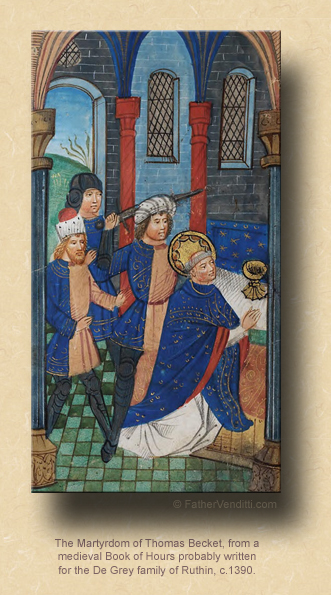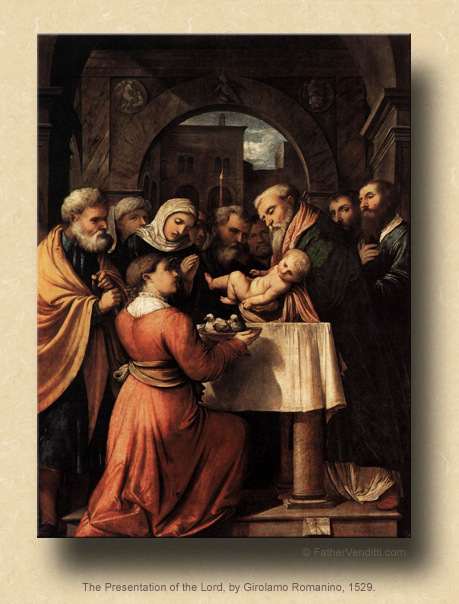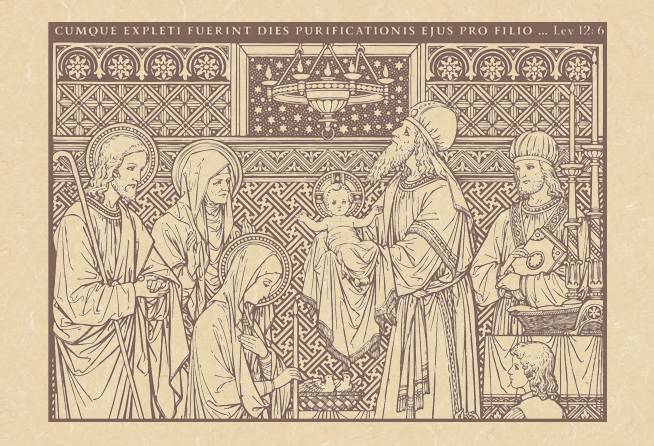Do We Recognize God When We See Him?
The Fifth Day of Christmas; and, the Commemoration of Saint Thomas Becket, Bishop & Martyr.*
Lessons from the feria, according to the ordinary form of the Roman Rite:
• I John 2: 3-11.
• Psalm 96: 1-3, 5-6.
• Luke 2: 22-35.
Outside England & Wales:
The Fifth Day of Christmas; and, the Commemoration of Saint Thomas of Canterbury, Bishop & Martyr.**
First & third lessons from the Second Mass of Christmas, Gradual from the Third Mass, according to the extraordinary form of the Roman Rite:
• Titus 3: 4, 7.
• Psalm 97: 3-4, 2.
• Luke 2: 15-20.
|
In England & Wales:
The First Class Feast of Saint Thomas of Canterbury, Bishop & Martyr; and, the Commemoration of the Fifth Day of Christmas.
Lessons from the proper, according to the extraordinary form of the Roman Rite:
• Hebrews 5: 1-6.
• [Gradual] Ecclesiasticus 44: 16.
• John 10: 11-16.
|
The Fifth Day of the Nativity; the Feast of the Holy Innocents Killed by Herod in Bethlehem; and, the Feast of Our Venerable Father Marcellus, Hegumen of the Akimetes.***
First & third lessons from the pentecostarion, second & third from the menaion for the Innocents, according to the Ruthenian recension of the Byzantine Rite:
• Titus 1: 5—2: 1.
• II Corinthians 5: 15-21.
• Mark 11: 27-33.
• Matthew 2: 13-23.
FatherVenditti.com
|
 9:15 AM 12/29/2016 — The Commemoration of Saint Thomas Becket hits home, as it seems a frequent theme raised in confession by many souls seeking perfection is the notion that it’s not enough to do the right thing, but to do it with total purity of intention, something I’m not entirely sure is possible. There's a wonderful line in T. S. Elliot's play, Murder in the Cathedral, which tells of Becket’s martyrdom. King Henry II sought to confiscate the property of the Church to finance his war with France; and Becket, who was Archbishop of Canterbury, was accused of treason for excommunicating him as a consequence. It's a scene that takes place the night before he figures the soldiers of the king will come to kill him, and he's being tempted with all kinds of thoughts regarding why he's so willing to die in defense of the rights of the Church. The last temptation he wrestles is the sin of pride: the notion that he's going to his death not because he desires to take a stand for the Church against the state, but because he harbors a secret desire to be canonized a saint. The whole play is written in verse like a poem—which is why it's rarely performed—and he has this wonderful line in which he says, “The last temptation is the greatest treason: to do the right thing for the wrong reason.” 9:15 AM 12/29/2016 — The Commemoration of Saint Thomas Becket hits home, as it seems a frequent theme raised in confession by many souls seeking perfection is the notion that it’s not enough to do the right thing, but to do it with total purity of intention, something I’m not entirely sure is possible. There's a wonderful line in T. S. Elliot's play, Murder in the Cathedral, which tells of Becket’s martyrdom. King Henry II sought to confiscate the property of the Church to finance his war with France; and Becket, who was Archbishop of Canterbury, was accused of treason for excommunicating him as a consequence. It's a scene that takes place the night before he figures the soldiers of the king will come to kill him, and he's being tempted with all kinds of thoughts regarding why he's so willing to die in defense of the rights of the Church. The last temptation he wrestles is the sin of pride: the notion that he's going to his death not because he desires to take a stand for the Church against the state, but because he harbors a secret desire to be canonized a saint. The whole play is written in verse like a poem—which is why it's rarely performed—and he has this wonderful line in which he says, “The last temptation is the greatest treason: to do the right thing for the wrong reason.”
He's wrestling with the very problem that the Blessed Apostle Paul so often puts before us: as Catholics, there are a lot of things we can't do and a lot of things we must do; and, sometimes, we must force ourselves to do them because we find them onerous. The solution is not to ignore them and simply not do them, as the Protestants would maintain. Nor is the solution to simply do them as a matter of rote, in the fashion of a Pharisee who follows the rules for the rules' sake. The solution is be so in love with Christ and his Church that we want to do them. But the Fifth Day of the Octave demands our most attention today.
The Presentation of the Lord, which forms our Gospel lesson for this Fifth Day of Christmas, is one of the very few episodes from the childhood of our Lord which the good Saint Luke most likely learned about from our Blessed Mother Herself.  We’ll hear this lesson again in February when we celebrate the actual Feast of the Presentation, which, you may recall, used to be known as the Feast of the Purification of the Blessed Virgin Mary. We’ll hear this lesson again in February when we celebrate the actual Feast of the Presentation, which, you may recall, used to be known as the Feast of the Purification of the Blessed Virgin Mary.
The Book of Leviticus lays down the rules by which mothers are to be purified after birth based on the Semitic notion of the impurity of women who give birth, which wouldn't have applied to our Blessed Mother because of the miraculous nature of the conception and birth of Her Son; and, by the early middle ages, Catholics were observing this custom as well. The rite involved the mother holding a candle, so the Church just decided to pretend that that's what the feast was really all about, which is when the blessing of candles became part of it, and it came to be referred to in English speaking countries as Candlemas Day.
But we can see, from the Gospel lesson read to us, that the real focus of this Gospel event is not the Mother of God, nor the fact that our Blessed Lord is brought to the Temple, but whom He meets there. He's brought there by his parents because of the command the Lord gave to Moses in Exodus 13: “Dedicate to me every first-born thing that Israel yields, whether it be man or beast, the first-fruits of every womb; all these are forfeit to me” (v. 2 Knox). God, in Leviticus, even specifies what kind of sacrifice must be made on this occasion:
When the days needed for her purification, after the birth of boy or girl, have run out, she must bring a lamb of one year old as a burnt-sacrifice, and a young pigeon or a turtle-dove by way of amends, to the tabernacle door. These she will hand over to the priest, who will offer them to the Lord and intercede for her, to win purification for her after the blood-losing. Such is the rule governing the birth of boy or girl. If she cannot lay her hand on a lamb fit to be offered, she must bring two turtle-doves or two young pigeons, one as a burnt-sacrifice and one by way of amends; these will suffice, and at the priest’s intercession she will be purified (12: 6-8 Knox).
Saint Luke doesn't quote these verses precisely, probably because he's doing it from memory; but, the reflection for us here should be how diligently Mary and Joseph obeyed all these laws, even though there was no compelling reason for them to do so. Regarding the sacrifice, the Holy Family takes the economic option, substituting two birds for the lamb and the bird, and if I were really clever I could offer some sort of reflection on that; but, the point is they obey the law nonetheless.
But then comes the meat of the whole thing: the meeting or encounter of our Blessed Lord with the prophet Simeon. On the Feast of the Presentation itself, those verses which relate the meeting with the prophetess Anna are also included: two unrelated people who may not even have known each other, both of them advanced in years, both of them choosing to spend their last days in the Temple giving themselves over to prayer. The prophecy of Simeon, recognizing the Christ Child as God, raises an interesting question: how did he know that there was anything special about this Child?  God's incarnation was total: there was nothing in His outward appearance that made this little Boy stand out. Our Blessed Lord was not walking around with a glowing halo over His head like a holy card, or have the word “messiah” tattooed on His forehead. Simeon’s life of prayer and penance must have given him a special insight in grace to be particularly attuned to divine things, and his recognition of Jesus as God reminds us of our need to constantly be on the watch for the manifestations of Christ among us—among our friends, our families, our trials and tribulations, and all the circumstances we have every day to encounter our Lord in places where we least expect Him. And what an important reflection for us that can be as this holy season proceeds. So often people in confession will complain that they're in a dark place, that they don't feel their prayers are being answered, that they don't feel the presence of God in their lives; but, the example of this elderly prophet points to the fact that this kind of consolation is the result of fasting and prayer and complete abandonment to the will of God. God's incarnation was total: there was nothing in His outward appearance that made this little Boy stand out. Our Blessed Lord was not walking around with a glowing halo over His head like a holy card, or have the word “messiah” tattooed on His forehead. Simeon’s life of prayer and penance must have given him a special insight in grace to be particularly attuned to divine things, and his recognition of Jesus as God reminds us of our need to constantly be on the watch for the manifestations of Christ among us—among our friends, our families, our trials and tribulations, and all the circumstances we have every day to encounter our Lord in places where we least expect Him. And what an important reflection for us that can be as this holy season proceeds. So often people in confession will complain that they're in a dark place, that they don't feel their prayers are being answered, that they don't feel the presence of God in their lives; but, the example of this elderly prophet points to the fact that this kind of consolation is the result of fasting and prayer and complete abandonment to the will of God.
Later in February, when the extended version of this Gospel lesson is read, it will end with Saint Luke telling us:
And now, when all had been done that the law of the Lord required, they returned to Galilee, and to their own town of Nazareth. And so the child grew and came to his strength, full of wisdom; and the grace of God rested upon him (2: 39-40 Knox).
So, the two secrets—if you want to call them that—to feeling and being attuned to the presence of God around us are obedience to His holy Will in how we live our lives, and giving ourselves over to prayer and penance. And, if we can do these things, then, when the course of our lives has run out, we will be able to pray along with Simeon, “Now, Master, you may let your servant go in peace, according to your word, for my eyes have seen your salvation…” (Luke 2: 29-31 NABRE).

* In the ordinary form, a memorial occuring during the Octave of Christmas becomes a commemoration: the Collect of the Saint may be taken, with everything else coming from the current day of the Octave. Inasmuch as the memorial of St. Thomas is optional, it can also be ignored altogether.
Born in London, Thomas Becket (1118-1170) studed in Paris. He was named Chancellor of England by his personal friend, King Henry II, who later nominated him to become Archbishop as Canterbury primarily as a means to control the Church and confiscate Church property to finance his military ambitions. Following a personal conversion, the new Archbishop defended the rights of the Church against the King, who exiled him for six years. Upon his return, he was murdered by agents of the King, and was almost immediately venerated as a martyr.
** In the extraordinary form, any feasts of the third class falling within the Octave of Christmas become commemorations, made by an additional Collect, Secret and Postcommunion added to those of the Octave feria; a separate Mass for the commemoration is not permitted during the Octave. However, in England and Wales, the Feast of St. Thomas is of the first class, and takes precedence over the day of the Octave, which is then commemorated in the same way.
*** In the Latin Church, the Feast of the Holy Innocents was observed yesterday.
Marcellus was born in Apamea near Hama in Syria. He became a monk and later hegumen (abbot) of the celebrated Monastery of Constantinople, called "the Akimetes," from the Greek meaning "never sleeping" or "never ceasing," because the monks there took turns in prayer so that there was never a time when prayers were not being recited. He died around 470.
|

